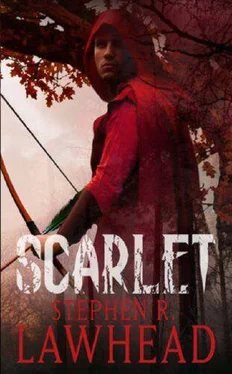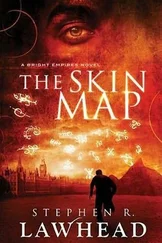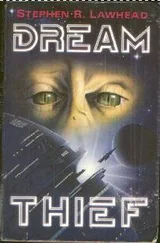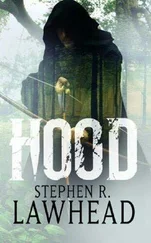Stephen Lawhead - Scarlet
Здесь есть возможность читать онлайн «Stephen Lawhead - Scarlet» весь текст электронной книги совершенно бесплатно (целиком полную версию без сокращений). В некоторых случаях можно слушать аудио, скачать через торрент в формате fb2 и присутствует краткое содержание. Жанр: Фэнтези, на английском языке. Описание произведения, (предисловие) а так же отзывы посетителей доступны на портале библиотеки ЛибКат.
- Название:Scarlet
- Автор:
- Жанр:
- Год:неизвестен
- ISBN:нет данных
- Рейтинг книги:4 / 5. Голосов: 1
-
Избранное:Добавить в избранное
- Отзывы:
-
Ваша оценка:
- 80
- 1
- 2
- 3
- 4
- 5
Scarlet: краткое содержание, описание и аннотация
Предлагаем к чтению аннотацию, описание, краткое содержание или предисловие (зависит от того, что написал сам автор книги «Scarlet»). Если вы не нашли необходимую информацию о книге — напишите в комментариях, мы постараемся отыскать её.
Scarlet — читать онлайн бесплатно полную книгу (весь текст) целиком
Ниже представлен текст книги, разбитый по страницам. Система сохранения места последней прочитанной страницы, позволяет с удобством читать онлайн бесплатно книгу «Scarlet», без необходимости каждый раз заново искать на чём Вы остановились. Поставьте закладку, и сможете в любой момент перейти на страницу, на которой закончили чтение.
Интервал:
Закладка:
Falkes entered the church. Cool and dim inside, it breathed an air of quiet serenity despite the steady chink of chisel on stone. He stood for a moment and watched the two masons on the wooden scaffold dressing the capitals of one of the pillars. One of them was carving what looked like a bear, and the other a bird.
"You there!" shouted Falkes, his voice loud in the quiet of the sanctuary. "What is your name?"
The masons stopped their work and turned to look down at the count, striding down the centre of the nave. "Me, Sire? I am Ethelric."
"What is that you are carving, Ethelric?"
"A raven, Sire," replied the sculptor, pointing to the leafy bough issuing from the face carved into the top of the pillar. "You can tell by the beak, Sire."
"Remove it."
"Sire?" asked the mason, bewilderment wrinkling his brow.
"Remove it at once. I do not wish to see any such images in this church."
The second stone-carver on the scaffold spoke up. "Begging your pardon, Sire, but the abbot has approved of all the work we are doing here."
"I do not care if the king himself has approved it. I am paying for it, and I do not want it. Remove the hideous thing at once."
"There you are, Count Falkes!" exclaimed Abbot Hugo, moving up the nave to take his place beside the count. His white hair was neatly curled beneath a fine cloth cap, and his robe was glistening white satin. "I saw your horse outside and wondered where you had gone." Glancing at the two stone-carvers on the scaffold, he nodded to them to get back to work and, taking the count by the arm, led Falkes down the aisle. "We'll let these men get on with their work, shall we?"
"But see here," protested the count.
"Come, there is something I wish to show you," said the abbot, surging ahead. "The work is going well. We have years of construction still before us, of course, but the building will soon be serviceable. I'm contemplating a consecration ceremony on the eve of All Souls. What do you think of that?"
"I suppose," agreed Falkes diffidently, "although Baron de Braose will not be likely to attend. But see here, that carving in there…"
The abbot opened the door and stepped out. "Why not?" he asked, turning back. He looped his arm through the count's and walked him into the market square. "I would very much like the baron to attend. In fact, I insist. He must see what we have achieved here. It is his triumph as much as my own. He must attend."
"I agree, of course," said Falkes. "However, the baron is away in France and not expected to return much before Christmas."
"Pity," sniffed the abbot, none too distraught. "Then we will simply wait. It will give us time to finish more of the corbels and capitals."
"That is what I wanted to speak to you about, Abbot," said Falkes, who went on to explain that his treasury was all but depleted and there would be no more funds to pay the workers. "I sent a letter to the baron-and it, like everything else, awaits his return from France."
Abbot Hugo stopped walking. "What am I to do until then? The men must be paid. They cannot wait until Christmas. The work must continue. The work must go on if we are ever to see the end of it."
"That is as may be," granted the count, "but there is no money to pay them until the baron returns."
"Can you not borrow from somewhere?"
"Do you really need cloth of gold to dress the altar?"
The abbot pursed his lips in a frown.
"You said you wished to show me something," said Falkes.
"This way," said the abbot. They walked across the empty market square to what was left of the former monastery of Llanelli, on whose ruins the town was being raised. The modest chapter house had been enlarged to provide adequate space for the abbot's needs-which, so it appeared to Falkes, were greater than his own, though he had a score of knights to house. Inside, what had been the refectory was now the abbot's private living quarters.
"I have drawn plans for the abbey garden and fields," the abbot said, placing a rolled parchment in the count's hands. "Some wine?"
"You are too kind," said Falkes. Unrolling the skin, he carried it to the room's single window and held it to the light. The outline of the town was a simple square, and the fields, indicated by long narrow parallel lines, seemed to be some distance from the town and almost twice as large as Llanelli itself. "What are you thinking of growing?"
"Flax mostly," replied the abbot, "and barley, of course. We will use what we need and sell the surplus."
"With such a great extent of fields," said the count, "you will surely have a surplus. But I am wondering who will work these fields for you?"
"The monks." Abbot Hugo handed him a cup of wine.
"How many monks do you reckon you will need?"
"As to that," replied the abbot with a smile, "I estimate that I can make do with no fewer than seventy-five, to begin."
"Seventy-five!" cried Falkes. "By the Virgin! If you had said thirty I would have thought that was fifteen too many. Why do you need so many?"
"To carry on the work of Saint Martin." Falkes turned an incredulous gaze upon the abbot who, still smiling, sipped his wine and continued, "It is ambitious, I confess, but we must begin somewhere."
"Saint Martin's?"
"You cannot imagine," said the abbot, "that we would continue to call our new Norman abbey by its old heathen Welsh name. In fact, I have prepared a letter to the pope requesting a charter to be drawn up in the name L'Abbaye de Martin de Saint dans les Champs."
At the mention of the pope, Falkes rolled up the parchment and handed it back to the abbot, saying, "You would be well advised to hold onto that letter a little longer, Abbot."
CHAPTER 8
King Raven's greenwood refuge served in most respects as a village for those forced to call it home. Deep in the forest, King Raven's flock had carved out a clearing below the protecting arm of a stony ridge. At great effort, they had extended the natural glade to include a pitiful little field for barley, a sorry bean patch, and one for turnips. They had dragged together bits of this and that for their huts and crude shelters, and the pens for their few scrawny animals. There was a patched-together tun which served as a granary for storing a scant supply of grain, and a seeping pool at the foot of the rock scarp that served them for a well.
In the days following the archery contest, I came to see the place in a little better light than had greeted me on first sight, but that en't saying much. For it did seem that a lorn and lonely air hung over the place-the vapour of suffering produced by the folk whose lives were bound to this perilous perch. No one was here who had hope of a better life elsewhere-saving, maybe, only myself. Now, a right fair forester like myself might find living in such a place no great hardship for a few weeks, or even months. But even I would be screaming to get free long before a year had come round. And these poor folk had endured it for more than a year-a tribute, I suppose, to Lord Bran and his ability to keep the flame of hope burning in their hearts.
I greatly wondered how they could keep such a place hidden, all the more since there was a bounty on Rhi Bran's head. The baron's reward had been set at a price, and it kept on creeping up, higher and higher as King Raven's deeds became more outrageous and damaging to the de Braose interests. The reward was enough to make me wonder how far some poor fella's loyalty might stretch before it snapped like a rotten rope. I also wondered how long it would be before one of the sheriff 's search parties stumbled upon Cel Craidd.
Yet as I settled in amongst my new friends, I soon learned that the location was well chosen to confound discovery; to find it would take a canny and determined forester well trained to the March, which the baron did not possess. Beyond that, the folk worked hard to keep their home secret. They contrived everything from confusing the trails to sowing rumours specially concocted for Norman ears and sending spies among the folk of Elfael and Castle Truan. They kept perpetual watch on the King's Road and the forest approaches 'round about, marking the movements of all who came and went through the March.
Читать дальшеИнтервал:
Закладка:
Похожие книги на «Scarlet»
Представляем Вашему вниманию похожие книги на «Scarlet» списком для выбора. Мы отобрали схожую по названию и смыслу литературу в надежде предоставить читателям больше вариантов отыскать новые, интересные, ещё непрочитанные произведения.
Обсуждение, отзывы о книге «Scarlet» и просто собственные мнения читателей. Оставьте ваши комментарии, напишите, что Вы думаете о произведении, его смысле или главных героях. Укажите что конкретно понравилось, а что нет, и почему Вы так считаете.







